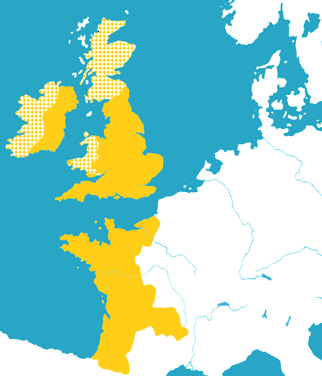I've never got the East-West claim. I mean, it might work in Europe but in Asia the axis of technological diffusion was North-South. Here's some examples off the top of my head:
- Paper was in use in Southeast Asia during the 600s, long before it reached Europe;
- Buddhism diffused into Southeast Asia before it reached China ;
- Sericulture in Thailand pre-dates by about three millenia its introduction to Europe;
- Rice diffused into Southeast Asia during pre-history; the "fast-ripening" varieties from Champa then diffused back into China in the 880s;
- Citrus fruit spread from Southeast Asia, North into China;
- Bronze casting was discovered in Thailand and was then introduced into China;
- The Dong Song material culture diffused North-South; and
- The Austronesian packet of crops also moved North-South.
Mouthwash said:
Empirical evidence supports this heavily. Look at every large pre-colonial empire in history and tell me which axis they all go along.
China runs North-South? Mesoamerica? The Andes?

*
TheLastOne36 said:
Conquering and Invading are supposed to be vague terms in the context of prehistoric migrations of peoples. I doubt Austronesians formally declared a war on the pre-existing populations and proceeding on to enact genocide against them.
I don't think "conquering" or "invading" are vague in the least. I'd even go so far as to call them loaded and emotive. That's bad scholarship right there.
TheLastOne36 said:
I find it more likely that Austronesian speakers with their advantageous position as an agriculturally developed peoples originating from likely China would arrive on the island and in little time out-populated, displaced and assimilate the local inhabitants.
The Taiwanese origin of Austronesian is pretty much conclusively proven. I have like zero bones with that. I think the second sentence is problematic because we're dealing with language transmission and not discrete biological groupings. The issue is of course that by assimilation, I mean the "adoption of Austronesian languages"* which is rather different from what you seem to be implying. The diffusion of Celtic languages into Britain is relevant in this case.
* Really we're not dealing with language transmission at all but changes in material culture which is how we date the "arrival" of Austronesian languages. Linguistic evidence can be material. But I decided to keep it simple.
TheLastOne36 said:
Epidemiological factors probably having played some role as well.
Provide some proof. Speculation, is well, speculation.
TheLastOne36 said:
I realize there is little evidence to support this as these events took place at a time before recorded history, however I reject that absent of knowledge is an absent of absent of case.
A lot of the views you've expressed so far (genocide for example) fall well outside of the parameters of the academic debate. On that basis I feel justified in doubting your suppositions.
TheLastOne36 said:
What I described above historically occurred globally when an agrarian society interacted with hunting-gatherer societies. I see no reason why it wouldn't happen in SE Asia. If there are reasons why, post them. Similarly, it makes sense that the same process failed to take place in New Guinea when an agrarian society encountered another agrarian society.
Got an academic citation for those claims?
Another important consideration is that farming was probably
about as significant as fishing as a source of food. In simple terms, Austronesians tended to live in coastal areas with good land and sheltered harbors, suitable for fishing.
TheLastOne36 said:
Also why the reluctance to consider that the pre-existent peoples of Indonesia prior to the arrival of Austronesian speakers from East Asia could have been related to Melanesians and Australian Aboriginees? It's coming across as protecting some sort of agenda rather than remaining objective.
Huh? I've said nothing at all about Melanesians or Aborigines.
TheLastOne36 said:
Regardless of people's views on him on this forum, his arguments relating to interaction of agrarian and hunting-gatherer societies is within his subject of scholarship, and they have merit and can be applied to the presumed interactions between agrarian and hunting-gatherer societies South-East Asia. If it's bull, why is it so in this particular case compared to others?
He's not a specialist and his offering is more a general overview than an original contribution. But it isn't like I *hate* him, or anything. I just thought GGS was weak? I also dislike his presentation of Easter Island in Collapse. But that isn't quite his fault; the literature that showed up the model he favored came out after Collapse was first published. I reserve judgement on reprints.
I'd also like to apologize. I kind of lost it last night. Blame it on end of term marking/lack of sleep/my brains refusal to write full sentences.








